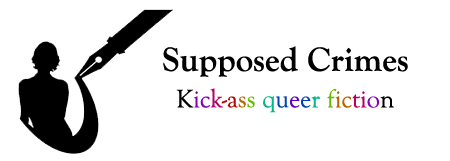
Last week, a lesser-known flash fiction contest went viral due to its refusal of LGBTQ material. The contest rules were then updated to clarify, but they remain antagonistic toward LGBTQ stories.
There are plenty of flash fiction contests that do not prohibit LGBTQ stories, and some that actively seek them. NYCMidnight, which begins every July, is one I personally have done, and I submitted lesbian fiction with no problem. Queer Sci Fi, another one in which my stories have appeared (and received a Judge's Pick) is specifically for LGBTQ+ speculative fiction (fantasy, science fiction, horror, etc.); it runs through March each year. There are others, most far more well-known than The Creative Writing Institute's contest.
The point here, though, is not the contest itself but about the way CWI's CEO plastered on the genre label "LGBTQ." Stories about gay, lesbian, bisexual, transgender, queer, asexual, intersex, etc. people are not a genre. They are not even a sub-genre.
At best, LGBTQ+ is a set of tag categories. It isn't a single entity. Placing everything into one very broad category based on the sexuality or gender of the main characters is bad business and leads to some books being overshadowed even within that category.
Calling books "LGBTQ" because of the content doesn't tell anyone a thing about what genre it actually is. It also creates expectations: that the story will contain a romance or relationship arc and/or on-page sex as proof of the character's identity or that it will be an Issues Book about identity. There's a prevailing attitude that readers will be shocked and horrified if they "accidentally" pick up a book in which the LGBTQ+ content hasn't been warned for, regardless of what the story is actually about. But how will LGBTQ+ books become mainstream, how will LGBTQ+ authors tell our stories for ourselves, if we are relegated to a tiny, self-contained shelf at the back of the book store?
Award-winning poet Jan Steckel refers to this separation of our work as a ghetto. She's not wrong. Because non-LGBTQ people are considered the default, our work is often believed to have limited appeal and reliability.
I've said for years now that we need to stop primarily shelving books even in our minds as "LGBTQ." We can mention that our work has LGBTQ themes or content, but we ought to be promoting our work by genre. It is the only way we will both break free from the literary ghetto and have our work more easily accessible to everyone.
